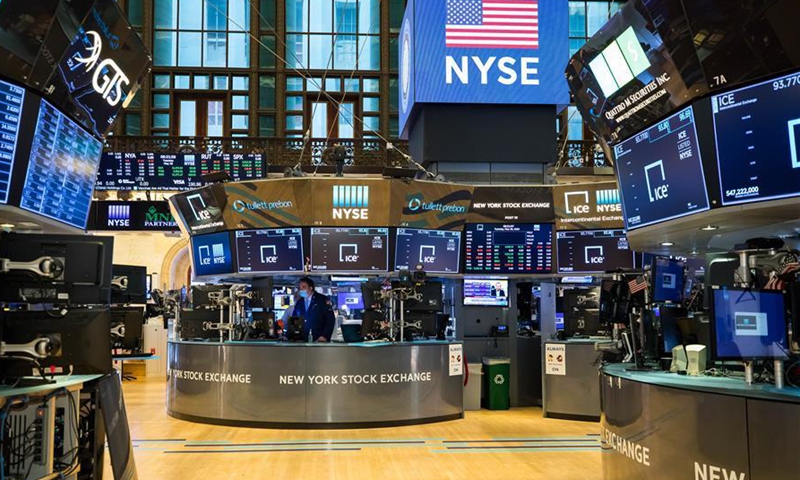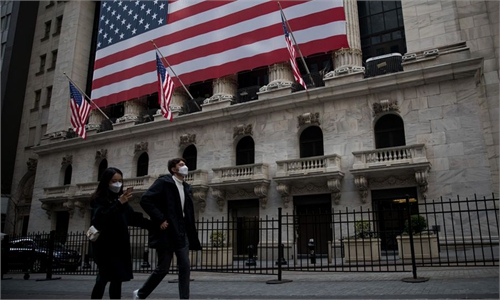SOURCE / INDUSTRIES
NYSE U-turn on Chinese telco delistings shows flexibility Biden wants on China issues: expert
Move signals flexibility Biden wants on China issues: expert

Photo taken on May 26, 2020 shows the trading floor of the New York Stock Exchange in New York, the United States. The New York Stock Exchange (NYSE) partially reopened its iconic trading floor on Tuesday after a two-month closure due to the COVID-19 pandemic. (Courtney Crow/NYSE/Handout via Xinhua)
The New York Stock Exchange (NYSE) said it no longer intends to delist three Chinese telecom companies - China Telecom, China Mobile and China Unicom (HK) - in a dramatic U-turn coming only days after it announced the move to comply with a US executive order. Chinese experts translated the move as a voice of reason from some in Wall Street and US political circle, who wish the incumbent US president won't hamstring the incoming Biden administration in making decisions related to China.
"In light of further consultation with relevant regulatory authorities in connection with the Office of Foreign Assets Control," the NYSE said it "no longer intends to move forward with the delisting action," according to a statement on Monday (US time) on the website of Intercontinental Exchange, which is the owner of the NYSE.
Responding to the reversal, China Unicom said on Tuesday that it will continue to be listed and traded on the NYSE, and the company will monitor the situation.
China Mobile confirmed on Tuesday that it will continue to be listed and traded on the NYSE, which will keep evaluating the applicability of the US executive order to the company and its listing status.
The move brought gains for Chinese telecom giants listed in the US. Shares of China Unicom rose about 21 percent in pre-opening trading and China Mobile nearly 10 percent on Tuesday.
Responding to the reversal by the NYSE, Chinese Foreign Ministry spokesperson Hua Chunying Tuesday reaffirmed that the US status as an international financial center hangs on the trust of international companies and global investors, which was built on a spirit of inclusiveness and certainty of rules, calling on the US to respect the rule of law and the market, and make more efforts to safeguard the global financial market order and legitimate rights of investors.
The move comes amid escalating tensions between the world's two largest economies in the financial sphere, from the US accusing China of manipulating its currency to some global indexes companies' moves to omit a number of Chinese firms from their component indices, such as FTSE Russell.
Chinese experts explained the NYSE's U-turn as a hint of the increased flexibility the Biden administration may take when it comes to China policies.
"Without giving detailed reasons, the NYSE's intention reflects flexibility that the incoming Biden administration may adopt, which is what US politicians and businessmen are looking for," Li Haidong, a professor at the Institute of International Relations at the China Foreign Affairs University, told the Global Times on Tuesday.
With Donald Trump's imminent departure from the White House and Joe Biden set to take office, Trump's "boundless style of bullying" may meet with strong resistance from some people on Wall Street and in the political circle, according to Li. "These people hope the incumbent US president will not try to hamstring the next president, who should have the flexibility to make decisions," Li said, saying they represent a voice of reason.
Dong Shaopeng, an advisor to the China Securities Regulatory Commission, personally welcomed the reversal, saying "it was a shame for the NYSE to get involved in the unfair political game that was initiated by some US politicians."
Prior to the NYSE's announcement, Dong told the Global Times on Monday that it would be possible for China to ask US companies doing business in China to reveal their own links to the US military.
On being asked about the proposal, Hua told reporters on Tuesday that China firmly opposes the US government's insidious attack on China's civilian-military integration drive, its penchant for politicizing commercial issues, and its crackdowns on Chinese companies by abusing its state power.
She added that a good number of US multinational companies are examples of civilian-military integration, and the US is imposing a double standard and taking aggressive measures to contain China's development.
Although Biden will take office on January 20, Chinese experts do not expect the competition or rivalry between the world's two largest economies will come to an end.
"Biden will deal with China issues with more flexibility but he may still take some as 'cards in hand' when negotiating with China on trade issues, such as intellectual property and government subsidy issues," Li added.
Dong also noted that Biden will seek a certain degree of stability in China-US economic and trade relations, but for strategic considerations, it is inevitable that Biden will continue to pressure and bargain with China.



